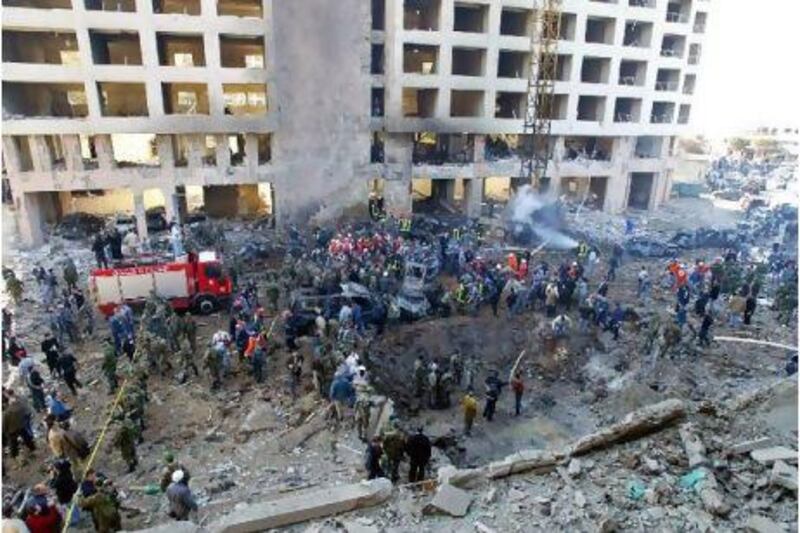THE HAGUE // Though they were long anticipated, Lebanon was rocked yesterday by four indictments from an international tribunal over the assassination of the former prime minister Rafiq Hariri in 2005.
The indictments remain officially sealed but the names were leaked in unconfirmed reports and two of the suspects are said to be members of Hizbollah.
The names that were given to news organisations by judicial sources were Salim Ayyash, Hassan Issa, Assad Sabra and Mustafa Badreddine, who is known as Sami Issa. Mr Badreddine and Mr Ayyash are said to be Hizbollah commanders.
Mr Badreddine is a cousin and brother-in-law of the late Hizbollah commander Imad Mughniyeh, who was assassinated in Damascus in 2008. Mr Badreddine is a member of Hizbollah's advisory Shura council and is said to be the group's former deputy military commander.
Mr Ayyash is said to have been the head of the Hizbollah unit that planned and carried out the assassination of Mr Hariri.
The indictments have been a divisive issue in Lebanon as they appear to implicate the powerful Hizbollah movement in the murder of Hariri, the country's pre-eminent Sunni leader at the time.
This January, Hizbollah brought down the unity government led by Hariri's son, Saad, because he refused the party's demand to cut ties with the UN-backed Special Tribunal for Lebanon, which is based in The Hague.
The tribunal was established to investigate the case.
The country's new prime minister, Najib Mikati, who finally took over last month from Saad Hariri, called for calm. "We should set the country's peace above all else as the indictments aren't verdicts. The sensitivity of the circumstances call on us to act reasonably to prevent those seeking to create strife from achieving their goals," he said.
In a sign of the tense atmosphere as the indictments were handed down, employees of the STL were sent home from their offices in Beirut as a security precaution.
Saad Hariri immediately called on the government to co-operate with the STL.
"The Lebanese government is invited politically, nationally, legally and morally, to implement Lebanon's obligations towards the Special Tribunal for Lebanon, and nobody has an excuse to escape from this responsibility," he said.
In an emotional statement, he called the indictment an "historic moment". Lebanon, he said, "has paid the price of this moment, in decades of killings and assassinations without accountability".
The murder of his father led to the Cedar revolution that ended decades of Syrian military presence in Lebanon. It was followed by a series of assassinations of anti-Syrian politicians and journalists. International investigators initially blamed Syria for the Hariri assassination but Damascus has always denied involvement.
At the moment there are no indications from the STL that it will issue indictments against any Syrians in the near future. Syria, along with Iran, is a major backer of Hizbollah.
It took the STL's pre-trial judge, Daniel Fransen, since January to rule on the evidence handed to him by the prosecutor, Daniel Bellemare. The indictment was amended and extended in March.
In a statement, the STL emphasised the Lebanon's obligation to cooperate with the tribunal. "Under the STL's Rules of Procedure and Evidence, the Lebanese authorities have to report to the STL on the measures that they have taken to arrest the accused, at least within 30 days of the transmission of the indictment."
Hizbollah's leader, Hassan Nasrallah, vowed in November to "cut off the hand" of anyone daring to arrest members of his movement. Hizbollah denies responsibility for the assassination and says the charges are part of an Israeli and American plot against the group.
A delegation from the international tribunal handed over the indictments and arrest warrants to the country's prosecutor just as Mr Mikati was putting the finishing touches to his new cabinet's policy statement, which he needs in order to govern. The sticking point had been the new government's attitude towards the tribunal, as Mr Mikati insisted that Lebanon abide by international agreements.
In the end the statement was left deliberately vague, saying that "the government confirms that it will follow the progress of the Special Tribunal for Lebanon, which was set up in principle to see justice served in a manner that is neither politicised nor vengeful, and as long as it does not negatively affect Lebanon's stability and civil peace".
In a press conference afterwards, Mr Mikati said the government will deal with the indictments "responsibly and realistically".
Michael Young, a Lebanese political analyst who contributes to The National, said the timing of the indictments was not linked to the political situation. The STL "assured me that the tribunal's clock is not a political one", he said.
The indictments pose a problem both for Mr Mikati and for Hizbollah, Mr Young said. The new prime minister will be faced with international demands and Hizbollah will in the longer term be faced with an undermining of its legitimacy, he said. The movement has also been shaken by the violence in Syria, its major ally. But Mr Young did not expect "blood in the streets" in Lebanon at this point.
The STL has the option to try the suspects in absentia if they cannot be brought to The Hague. But it stressed in a statement that the presence of the suspects in the courtroom was the "best option" for all.





